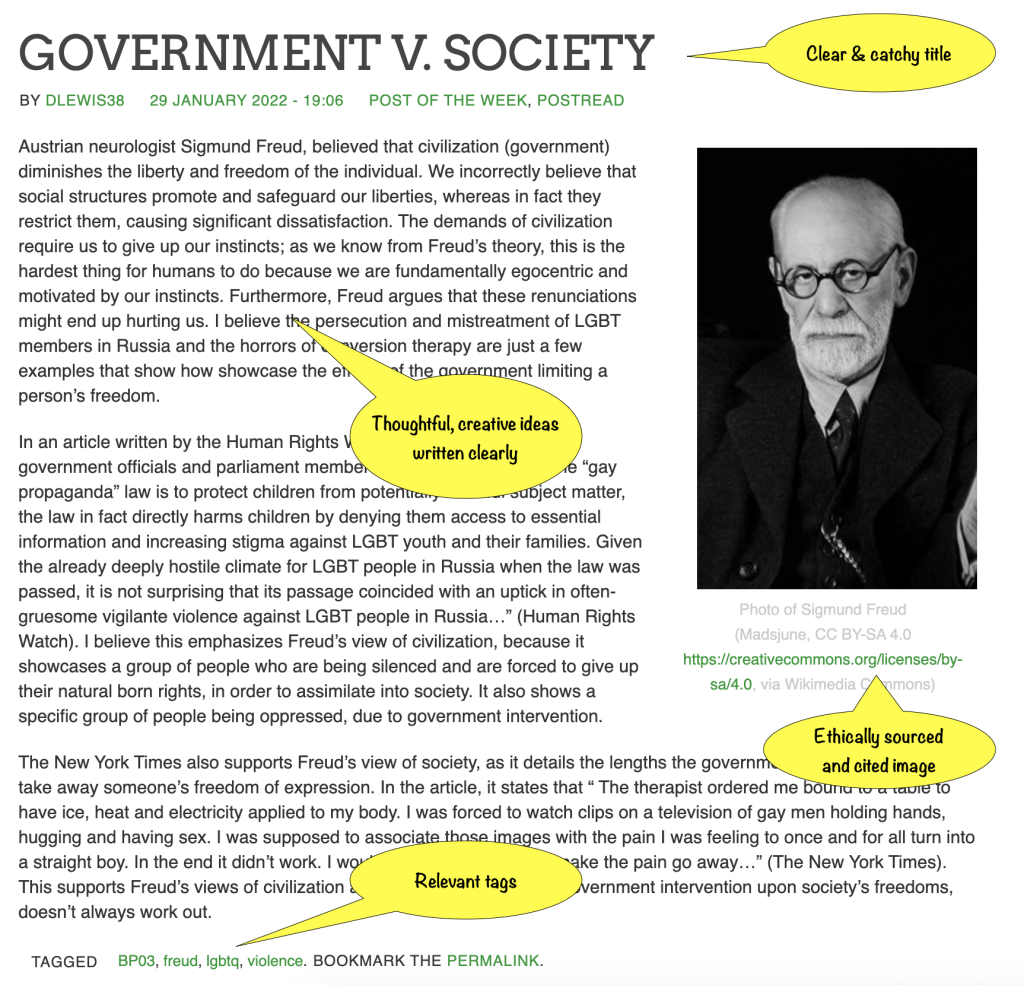Purpose
As this class is an attempt to consider how the imaginary can be demonstrative of the real, it is important for us to share our learning not just with each other, but with anyone willing to listen. To that end, we will regularly contribute to a course blog as a way to reflect upon our learning within the public sphere. Your blog posts will allow you to practice your analytical, critical thinking, and writing skills, as it allows you to share your thoughts on how our study of the nature of dystopias impacts the mission of the university. These posts will also give you the opportunity to improve your skills as a responsible worker, a self-regulated learner, and a technology user.
Connected Course Outcomes
- Identify the defining characteristics of dystopia & analyze real & imagery contexts against that definition.
- Communicate effectively through writing & speaking.
- Use quantitative, empirical, and critical reasoning skills to solve problems.
- Apply socially responsible & ethical principles to promote equity & sustainability in ways that align with our mission as a historically Black and Catholic Institution.
- Demonstrate personal accountability & effective work habits.
Task
Blog posts are meant to be well-written, thoughtful, and thought-provoking; the best will stimulate discussion in other posts and in the classroom. Feel free to end your post with questions you haven’t answered yet or would like to hear your classmates answer. Images and videos are excellent additions (as long as they are classroom appropriate). Blogs should be at least 300 words and 2-3 paragraphs long, and you want most of your post to be content (don’t waste time on empty statements, repetition, or quotation). The best blog posts will both demonstrate you’ve done the readings and will show you have understood and analyzed it. Blogs should never be a summary of what you’ve read or heard.
You must complete all of the blog posts below. Posts must be made by the end of the day on the designated Saturday (although you are under no obligation to wait until Saturday to write your blog post).
- Jan 20: How do you define dystopia?
- Feb 03: Describe your personal utopia.
- Feb 17: What form of government should we choose?
- Mar 25: Is Edward Snowden right?
- Mar 23: Is Michel Foucault right?
- Apr 20: How do you define dystopia, redux?
Getting Started
- Be sure you have logged into our blog using the link emailed to your XULA account and have changed your password.
- If you are not familiar with posting to WordPress, watch the tutorial video.
- If you haven’t already, read “Interrogating Texts” & “Reflecting on Learning” on the course web site.
- Read the prompt for the given blog post carefully and be sure you understand what is being asked.
- Be sure to follow the minimum requirements above (but don’t feel constrained by those).
- Set the category and tags of your post using the label(s) designated in the prompt, as well as other relevant indicators.
- Consider incorporating an ethically sourced image or video to enhance your ideas.
EVALUATION
You will not receive a grade for your blog. On the Grades page, you will receive one of the following designations:
- Completed, meets all expectations)
- Completed, does not meet all expectations
- Not completed
Instead of a grade or score, I will give you feedback either in writing or through a short video. My feedback will focus on how well I think your work demonstrates your efforts with the learning outcomes listed above.
EXPECTATIONS
Each of your blog must meet all of the following in order to be considered complete:
- Be completed on time.
- Be a minimum of 300 words (no maximum).
- Be clearly written and organized.
- Appropriately respond to the designated prompt.
EXAMPLE OF GREAT WORK
For each bi-weekly prompt, I will designate one person’s as the Post of the Week. The image below is an annotated example of an exceptional blog post by a former student.




